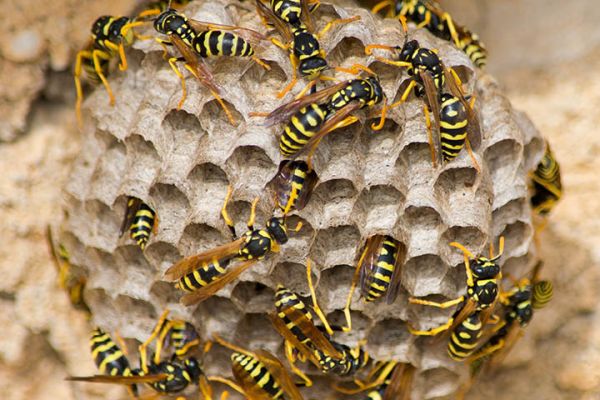The Most Aggressive Stinging Insects and How to Remove Their Nests!

If you have ever been stung by a wasp, hornet, or bee, you know just how painful the experience can be. Worse yet, if you have a nest of aggressive stinging insects nearby, you may find yourself in a dangerous situation. In this blog post, we will explore the most aggressive stinging insects and the best ways to safely remove their nests. We will also provide tips for wasp nest removal and stinging insects control. Read on to find out more!
Bees
Bees are one of the most common and widely known stinging insects, with an estimated 20,000 species across the world. Bees are typically harmless and beneficial to their environments, playing a crucial role in pollination and creating natural honey. However, when their nests are disturbed, bees can become quite aggressive and pose a danger to anyone nearby. Bee control is essential for ensuring safety in populated areas.
To remove a bee nest, start by wearing protective gear to protect your face, hands, and any exposed skin from stings. Then, spray the nest with an insecticide specifically designed to target bees. This will usually kill the bees within 24 hours. Once the bees are dead, use a vacuum cleaner to carefully remove the nest from the area. For larger nests, it is advisable to contact professional hornet nest removal services to avoid any potential injury or property damage.
Wasps
Wasps are a common nuisance for many homeowners, especially during the summer months when they are most active. Wasps have an aggressive attitude and will sting if provoked or threatened. They feed on nectar and sweet liquids, so they may often be found near garbage cans and hummingbird feeders.
There are several different species of wasps, including paper wasps, mud daubers, and yellow jackets. All wasps will sting if provoked, and they can be dangerous in large numbers. The best way to manage wasps is to eliminate their nesting sites. Common areas to check include eaves, attics, window frames, and anywhere else you may find a hole or crevice. If you come across a nest, it’s important to call a professional for safe and effective bee control.
It’s also important to take precautions to prevent wasps from building new nests around your home. Keep garbage bins sealed tightly and avoid leaving sugary drinks or food out in the open. If you have a hummingbird feeder, make sure it is cleaned regularly and that there are no sources of standing water nearby. You can also apply natural deterrents such as peppermint oil, which wasps find unpleasant.
When dealing with a hornet nest removal, it’s always best to call a professional who can take care of it safely and efficiently. However, if you do decide to take matters into your own hands, make sure to wear protective clothing and use insecticidal sprays or dusts specifically designed for wasp control.
Hornets
Hornets are a type of social wasp that can be found throughout the world. They are larger than bees, and their sting can be more painful. Hornets make aerial nests, usually in trees or other high areas. In some cases, these nests may end up near human dwellings, which can be a safety hazard. Hornets tend to be territorial and aggressive if disturbed, so it is important to take caution when near their nests.
If you have a hornet’s nest near your home, it’s best to call a professional bee control specialist to remove it safely. If you decide to remove the nest yourself, always use protective clothing and keep a safe distance. For maximum safety, contact a professional hornet nest removal service. They will be able to provide the right equipment and techniques to ensure the safe removal of the nest.
Yellow Jackets
Yellow Jackets are a type of wasp, and like all wasps, they can be quite aggressive when defending their nest. They are mostly black and yellow in color and often have white markings on their faces and abdomens. Yellow Jackets build nests in the ground, often under decks or in other areas around the home. Unlike bees, which only sting once, Yellow Jackets can sting multiple times, making them especially dangerous.
When it comes to removing a Yellow Jacket nest, it's best to call a professional bee control or hornet nest removal specialist. They will use special protective gear to protect themselves and can safely remove the nest without putting you at risk. It is not recommended that you try to remove a Yellow Jacket nest yourself as they can become quite aggressive if disturbed.
Find out more details at https://www.lahirupestcontrol.lk/services/bee-wasp-hornet-control